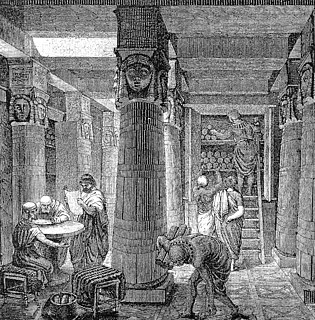Related Research Articles

Alexandria is the third-largest city in Egypt after Cairo and Giza, seventh-largest city in Africa, and a major economic centre. With a total population of 5,200,000, Alexandria is the largest city on the Mediterranean – also called the "Bride of the Mediterranean" by locals – the sixth-largest city in the Arab world and the ninth-largest urban area in Africa. The city extends about 40 km (25 mi) at the northern coast of Egypt along the Mediterranean Sea. Alexandria is a popular tourist destination, and also an important industrial centre because of its natural gas and oil pipelines from Suez.

Euclid, sometimes called Euclid of Alexandria to distinguish him from Euclid of Megara, was a Greek mathematician, often referred to as the "founder of geometry" or the "father of geometry". He was active in Alexandria during the reign of Ptolemy I. His Elements is one of the most influential works in the history of mathematics, serving as the main textbook for teaching mathematics from the time of its publication until the late 19th or early 20th century. In the Elements, Euclid deduced the theorems of what is now called Euclidean geometry from a small set of axioms. Euclid also wrote works on perspective, conic sections, spherical geometry, number theory, and mathematical rigour.

The Great Library of Alexandria in Alexandria, Egypt, was one of the largest and most significant libraries of the ancient world. The Library was part of a larger research institution called the Mouseion, which was dedicated to the Muses, the nine goddesses of the arts. The idea of a universal library in Alexandria may have been proposed by Demetrius of Phalerum, an exiled Athenian statesman living in Alexandria, to Ptolemy I Soter, who may have established plans for the Library, but the Library itself was probably not built until the reign of his son Ptolemy II Philadelphus. The Library quickly acquired many papyrus scrolls, due largely to the Ptolemaic kings' aggressive and well-funded policies for procuring texts. It is unknown precisely how many such scrolls were housed at any given time, but estimates range from 40,000 to 400,000 at its height.
Patriarch Nicholas I may refer to:

The Patriarch of Alexandria is the archbishop of Alexandria, Egypt. Historically, this office has included the designation "pope".
Pope Michael III of Alexandria was the Coptic Pope of Alexandria and Patriarch of the See of St. Mark (880–907).
Eutychius of Alexandria was the Melkite Patriarch of Alexandria. He is known for being one of the first Christian Egyptian writers to use the Arabic language. His writings include the chronicle Nazm al-Jauhar, also known by its Latin title Eutychii Annales.
Meletius I Pegas served as Greek Patriarch of Alexandria between 1590 and 1601. Simultaneously from 1597 to 1598 he served also as locum tenens of the Ecumenical Patriarchate of Constantinople. He is honoured as a saint in the Eastern Orthodox Church, with his feast day held on September 13.

The Greek Orthodox Patriarchate of Alexandria and all Africa, also known as the Greek Orthodox Church of Alexandria, is an autocephalous patriarchate that is part of the Eastern Orthodox Church. Its seat is in Alexandria and it has canonical responsibility for the entire African continent.
Marius Mercator was a Latin Christian ecclesiastical writer best known for his advocacy of Augustinian theology during the Pelagian controversy.
Christodoulos (Χριστόδουλος) is a Greek given name. It is a theophoric name which means "servant of Christ". It can refer to:

Euthymius I Syncellus was the Ecumenical Patriarch of Constantinople from 907 to 912. A monk since his youth, he became spiritual father of the future emperor Leo VI the Wise, and was raised by him to the high ecclesiastical office of syncellus. Despite his turbulent relationship with Leo, in 907 he was appointed to the patriarchate and held the post until his deposition shortly before or after Leo's death in 912.
The Battle of Constantinople was a Gothic attack on Constantinople in 378 following the Gothic victory at the Battle of Adrianople. The emperor Valens's widow prepared the defence, and also reinforced the city with Arab warriors, who performed excellently in combat. It is said that the Goths were impressed when one of the Arab warriors stormed out of the city naked, slaughtered enemies, and drank blood from the neck of a decapitated Goth. Other sources maintain that the Goths actually abandoned the attack because they were greatly outnumbered.
Cosmas III may refer to:
Patriarch Nicholas may refer to:
Patriarch Elias may refer to:
Euthenae or Euthenai was a coastal town of ancient Caria, on the Ceramicus Sinus.
References
- "Christodoulus (907–932)". Official web site of the Greek Orthodox Patriarchate of Alexandria and All Africa. Retrieved 2011-02-07.
| Preceded by Michael II | Greek Patriarch of Alexandria 907–932 | Succeeded by Eutychius |
| | This article about an Eastern Orthodox bishop is a stub. You can help Wikipedia by expanding it. |